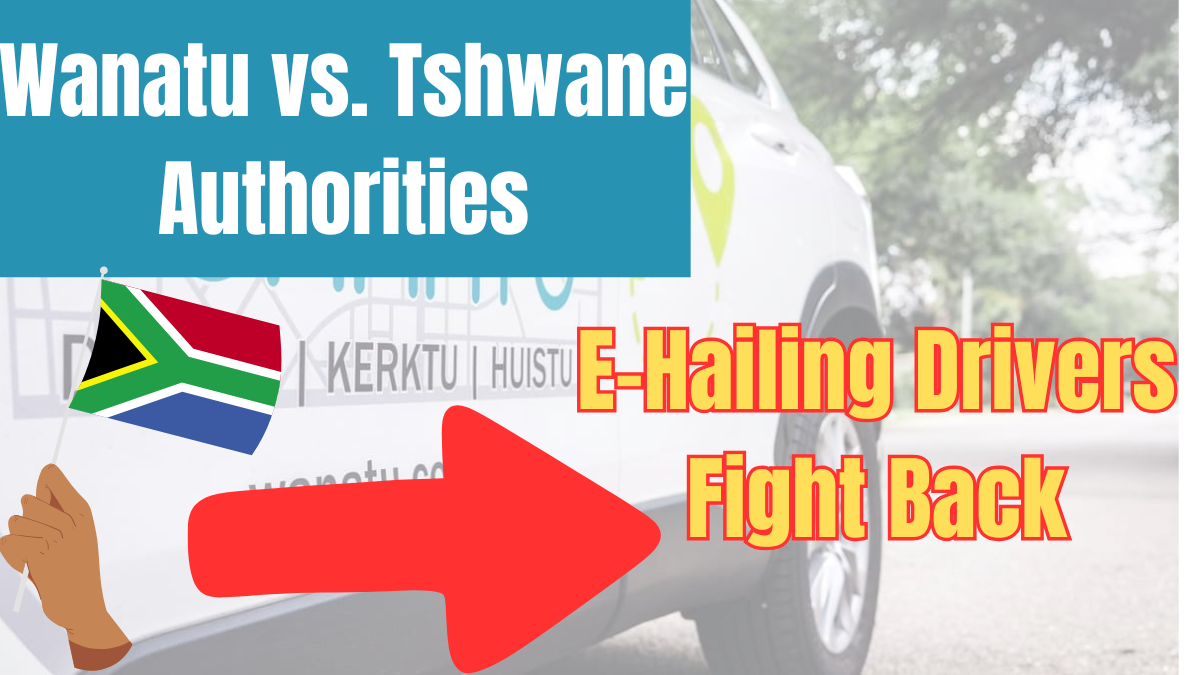Wanatu, a newly launched e-hailing platform, has taken a bold step by suspending operations and challenging South African authorities in court. The company’s legal battle follows the impoundment of two of its vehicles by the Tshwane Metro Police Department (TMPD), a move it calls “unlawful and unfair.”
The company claims its drivers are being targeted, and with thousands of e-hailing drivers struggling with permit issues, the case has gained massive support across the industry.

What Is Wanatu?
Wanatu launched in 2024, offering a unique e-hailing service where all its drivers are fluent in Afrikaans. The name Wanatu is derived from the Afrikaans word “waarnatoe”, meaning “where to?”
Unlike competitors such as Bolt, Uber, and InDrive, Wanatu is now fighting for driver rights in court, claiming authorities are unfairly enforcing outdated and inconsistent policies.
Why Are E-Hailing Drivers Struggling in South Africa?
The legal battle between e-hailing drivers and South African authorities has been escalating since an amendment to the National Roads Traffic Act came into effect in June 2024.
While the new law introduced road carrier permits specifically for e-hailing drivers, the Gauteng Roads and Transport Department has a severe backlog in issuing them.
What Is the Current Permit Crisis?
- More than 20,000 e-hailing drivers are still waiting for their road carrier permits.
- New permit applications have been suspended since November 2023.
- The permit backlog has dragged on for over a year, leaving drivers unable to work legally.
With no clear solution, e-hailing drivers in Tshwane are left with two options:
- Stop working and lose their source of income.
- Continue operating and risk having their vehicles impounded.
How Is the Tshwane Metro Police Targeting E-Hailing Drivers?
The TMPD has set up roadblocks in high-traffic areas, specifically targeting e-hailing drivers for operating without road carrier permits.
Common Complaints from Drivers Include:
- Being fined and having vehicles impounded despite applying for permits.
- Bribery allegations, with some drivers claiming they must pay between R3,000 and R6,000 to retrieve their vehicles.
- The inability to work legally, as the permit system remains frozen.
Despite calls for leniency from provincial authorities, the TMPD continues strict enforcement, leading to growing frustration among drivers.
Wanatu’s Legal Battle – What Does It Mean for E-Hailing in South Africa?
On 6 February 2025, Wanatu invited all e-hailing drivers facing similar issues to join its legal case against Tshwane authorities.
Within just two days, over 200 drivers from Bolt, InDrive, and Uber expressed interest in joining the case.
The case has also gained backing from:
- The Lions, a non-profit organization supporting driver rights.
- The Tshwane West E-hailing Association, soon to be registered as Mzansi Independent E-Hailing Partners.
Wanatu believes a court ruling in their favor could set a major legal precedent, forcing authorities to address the permit crisis fairly.
How Are Other E-Hailing Companies Responding?
Unlike Wanatu, other e-hailing services, including Uber, Bolt, and InDrive, have continued operations in Tshwane.
However, Wanatu’s distinct branding makes its vehicles an easier target for impoundment, increasing risks for its drivers.
Have E-Hailing Drivers in South Africa Faced Similar Issues Before?
This is not the first time e-hailing drivers have clashed with South African authorities.
In 2022, Cape Town e-hailing drivers went on strike after over 2,000 vehicles were impounded for operating without permits.
The issue at the time?
- The city had frozen new permit applications, forcing drivers into legal limbo.
- Authorities justified the freeze by saying it was to protect the metered taxi industry.
The current crisis in Tshwane echoes the same problems, with thousands of drivers caught between outdated laws and strict enforcement.
What Happens Next for Wanatu and E-Hailing Drivers?
With support growing, Wanatu’s legal challenge may bring:
- A court ruling on the fairness of TMPD’s enforcement.
- A government response to the backlog in permit applications.
- New industry standards for e-hailing regulations in South Africa.
For now, the legal battle continues, but its outcome could reshape the future of ride-hailing services in the country.
FAQs
What is Wanatu?
Wanatu is a South African e-hailing platform that offers services in Afrikaans and aims to fight for driver rights.
Why did Wanatu suspend operations?
Wanatu halted operations on 5 February 2025 after Tshwane Metro Police impounded its vehicles, claiming unfair treatment.
Why are e-hailing drivers struggling with permits?
The Gauteng Roads and Transport Department has over 20,000 pending permit applications, causing a major backlog that has lasted over a year.
How is the Tshwane Metro Police enforcing permit laws?
TMPD is stopping e-hailing drivers at roadblocks, impounding vehicles, and fining drivers despite the permit backlog crisis.
How much do drivers have to pay to retrieve impounded vehicles?
Some drivers report paying between R3,000 and R6,000 to get their vehicles released.
Who is supporting Wanatu’s legal battle?
Wanatu is backed by The Lions non-profit organization and the Tshwane West E-hailing Association (Mzansi Independent E-Hailing Partners).
Has this issue happened before in South Africa?
Yes, in 2022, Cape Town e-hailing drivers went on strike after the city froze permit applications and impounded over 2,000 vehicles.
What will happen if Wanatu wins the court case?
A ruling in Wanatu’s favor could:
- Change how e-hailing permits are handled.
- Force authorities to clear the permit backlog.
- Reduce unfair enforcement actions against drivers.
Click here to know more.
Aanchal is a passionate writer with a keen interest in storytelling, content creation, and creative expression. She enjoys exploring diverse topics and crafting engaging narratives that captivate readers.
